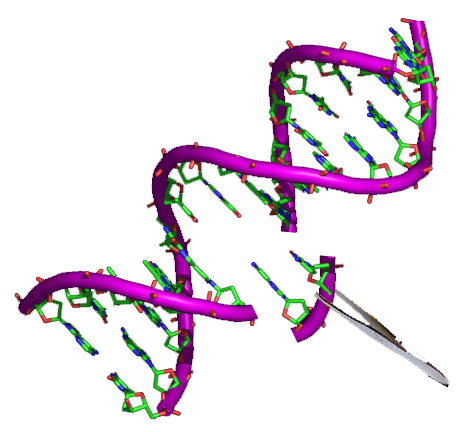Genetic Engineering now and in future
Scientists and engineers will never cease to prove that the potentials of technology are exhaustless. From self-driving automobiles to robots performing surgical operations, the world has seen several thought-provoking innovations that have drastically altered and given a new normal to conventional patterns of doing things in various industries.
One of the most mind-puzzling technological applications that the world has witnessed is genetic engineering. Imagine a technology that makes it possible for scientists to alter the genetic makeup of an organism? The thought of the fact that the genes of an organism can be manipulated can stir up curiosity in the minds of anyone just getting to know about it. This only demonstrates how rapidly technological advancements are changing our lives.

 , CC BY-SA 3.0, https://commons.wikimedia.org/w/index.php?curid=75624775
, CC BY-SA 3.0, https://commons.wikimedia.org/w/index.php?curid=75624775What Is Genetic Engineering?
The term "genetic engineering", a technique of biotechnology, simply refers to the artificial modification, manipulation, or recombination of deoxyribonucleic acid (DNA), or other nucleic acid molecules to change the structure and nature of genes in an organism to bring about a great deal of transformation that would not normally happen in nature.
The modification to give rise to new and desired traits in organisms – microbes used for food, plants, and animals, dates back to over 10,000 years ago. This genetic manipulation alongside natural evolutionary alterations explains why most food species we see around us now are a lot different from their ancestors and parents alike genetically.
This very interesting aspect of science has triggered queries and concerns about how it could interfere with nature's matchless works. Although the questions and controversial debates about genetic engineering are still well and alive, the positive facet of the emerging technology gives it an edge.
Applications Of Genetic Engineering
Genetic engineering is often linked to the foods we consume and the crops we grow. However, what isn't widely known is that genetic engineering is a field that has broad applications. Industries across the globe apply genetic engineering in several aspects of their field. The daring technology has applications in medicine, industry, research, and agriculture.
In Medicine: Genetic engineering has been applied severally in medicine. It has been used in the mass production of insulin and certain hormones used to facilitate human growth. It is also used to produce drugs for different ailments in humans. One of the popular and most promising applications of genetic engineering in medicine is the development and production of vaccines commonly used to improve quality of life and fight chronic illnesses. Treatments for fertility problems, blood clotting, hemophilia, and even dwarfism, largely depend on processes involving genetic engineering, including immunotherapy used to formulate treatments for cancer.
In Industry: Genetic engineering has been exceptionally useful for producing recombinant microorganisms that have an extensive variety of industrial applications. It has been applied in the production of modified bacteria that deplete hydrocarbons. These microbes are used to devour oil slicks and tidy up sites and areas contaminated with toxic wastes that humans can not clean up. Microbes created genetically are also used in industries to produce enzymes in laundry detergents, cheeses, and solutions for contact lenses. Genetically engineered recombinant nuclei also are used to create substances that can be converted to polymers such as polyester which are used in bedding and other polyester-powered products.
In Research: Genetic engineering has been applied by scientists in numerous industrial sectors and fields including research. In research, genetically modified organisms (GMOs) are used to research and study genetic makeups, gene functions, and expression through loss and gain of expression, tracking, and expression experiments.
In Agriculture: The vast majority of crops such as cotton, soybeans, and corn are genetically modified in some parts of the globe. The use of recombinant DNA in agriculture has made it possible for scientists to develop crops with certain traits that they can't have naturally that can enhance crop yield as well as increase the nutritional value. These kinds of crops are generally termed GMOs – Genetically Modified Organisms.
Through gene manipulation and modification, scientists have produced perishable crops like tomatoes with longer shelf lives and pest-resistant tubers. With genetic engineering, the world of agriculture has seen nutrient-dense foods. The "Golden rice" is a good example. It is a variety of white rice that has been infused with beta-carotene(a prototype of vitamin A). It was developed to help populations in developing countries where deficiency in vitamin A has a wide prevalence.
Benefits Of Genetic Engineering
Genetic engineering is poised to offer endless possibilities to various fields. In agriculture, genetic engineering will increase crop yields and reduce the need for pesticides with the production of more pest-resistant crops. The costs for food or drug production will reduce drastically. Nutrient composition and the quality of food will be enhanced. That is in addition to loads of medical benefits to the world's growing population. Think of a world where infectious illnesses and opportunistic diseases are dramatically curbed using a particular kind of technology, health and wellness become the order of people's lives, and living becomes better.

Genetic engineering can help tackle the most deadly diseases that have resisted several treatments and procedures. Potential illnesses in unborn children can be detected and completely wiped out with genetic engineering. Children can be born strong and healthy, and free from all kinds of illnesses and diseases. Genetic engineering can also be employed to help parents who risk passing on chronic degenerative diseases to their unborn to guarantee longer lives and healthy living. Seemingly, there are endless benefits to genetic engineering.
Conclusion
Chances are we might be moving towards a genetically engineered future. Although the amazing technology is not without controversy, it poses a change with some positive impact up its sleeves. The genetic revolution is gradually changing our sectors. Healthcare and agriculture especially, are making some changes that could be around for a long time if not for a lifetime.
Presently, crops are genetically powered to be able to survive in certain harsh conditions they would not normally be able to handle. Genetically engineered organisms are used to study gene functions. Hormones and vaccines as well as numerous life-saving drugs, created through genetic engineering are setting the pace for the genetic future.
Resources
- https://www.genome.gov/genetics-glossary/Genetic-Engineering
- https://metinalista.si/10-successful-examples-of-genetic-modification/
- https://www.ncbi.nlm.nih.gov/books/NBK217998/
-https://bio.libretexts.org/Bookshelves/Microbiology/Book%3A_Microbiology_(Boundless)/7%3A_Microbial_Genetics/7.23%3A_Genetic_Engineering_Products/7.23B%3A__Applications_of_Genetic_Engineering - https://en.wikipedia.org/wiki/Genetic_engineering
Congratulations @ummar! You have completed the following achievement on the Hive blockchain and have been rewarded with new badge(s) :
Your next target is to reach 40 posts.
You can view your badges on your board and compare yourself to others in the Ranking
If you no longer want to receive notifications, reply to this comment with the word
STOPSupport the HiveBuzz project. Vote for our proposal!
Genetic engineering has many benefits, especially in agriculture, I see a lot of superior seeds that are resistant to disease and also more productive compared to the old ones. and it gives more profit to the farmers
Thanks for your contribution to the STEMsocial community. Feel free to join us on discord to get to know the rest of us!
Please consider supporting our funding proposal, approving our witness (@stem.witness) or delegating to the @stemsocial account (for some ROI).
Please consider using the STEMsocial app app and including @stemsocial as a beneficiary to get a stronger support.
Great write up. I think in general genetic engineering can result in positive benefits, but we must remember we should do it in a slow and controlled way with the appropriate controls. the last thing we want is a super bacteria that resists all antibiotics because of the lack of controls in the genetic engineering process.
Also this article got me wondering whether we could genetically engineer organisms to efficiently soak up CO2 form the atmosphere, and then store it somehow? Well that's what plants do anyway right? probably there are people working on this already...
I agree with you that the genetic manipulation of organisms should be closely controlled and carefully threaded. ALso, the benefits must far outweigh the negatives before any consideration.
I am certain something is already in the pipeline considering genetically engineered organisms that can sequestrate CO2. Thanks for reading my submission and the insightful comment.